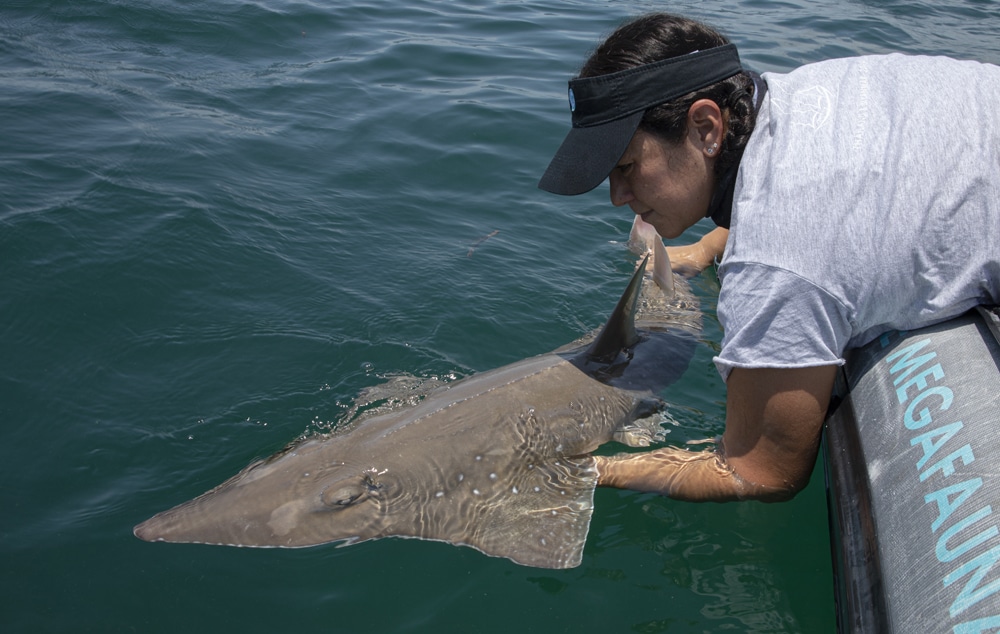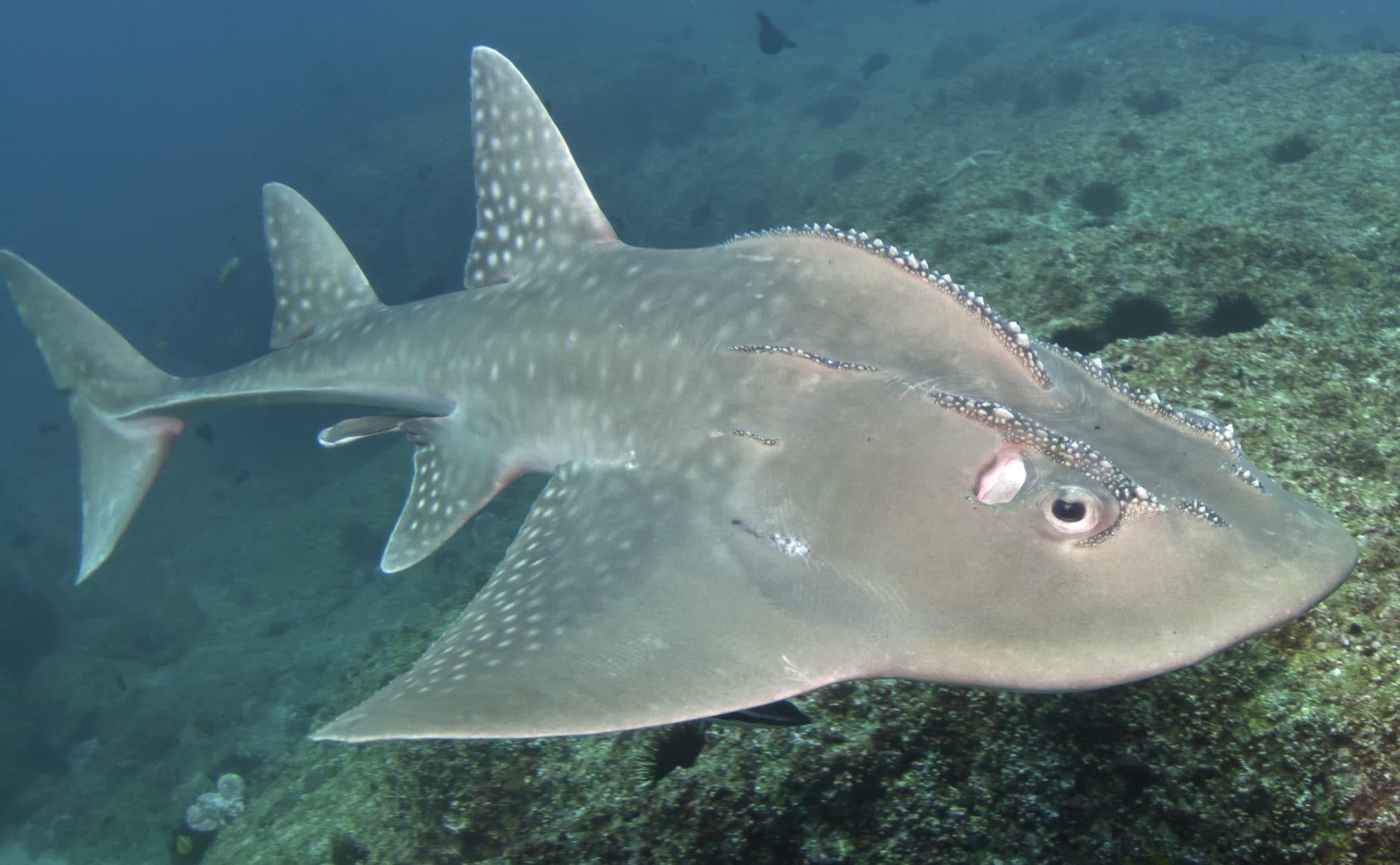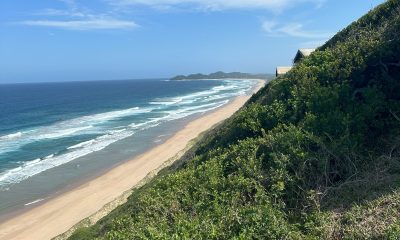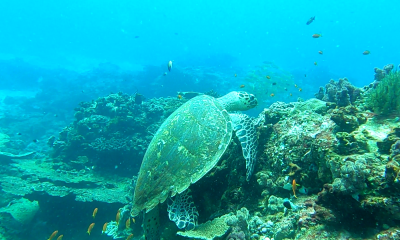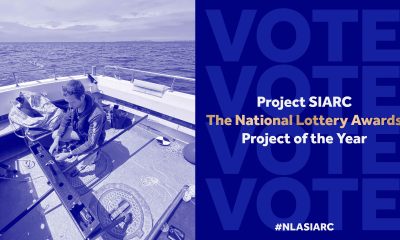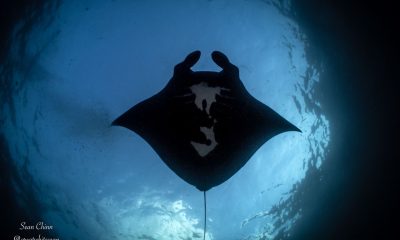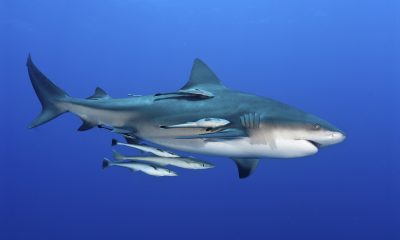Marine Life & Conservation
First of its kind Wedgefish tagging study
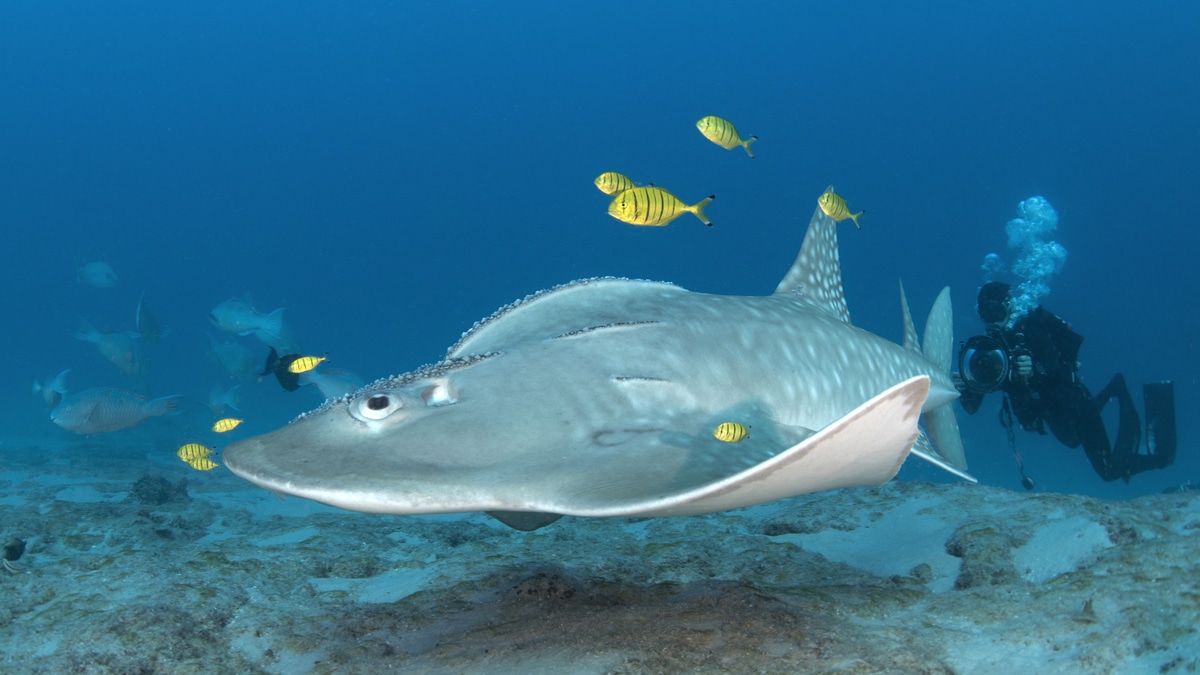
 Scientists from the Marine Megafauna Foundation (MMF) have placed acoustic and pop-up archival satellite tags on two species of wedgefish, the bottlenose wedgefish (Rhynchobatus australiae) and the bowmouth guitarfish (Rhina ancylostoma), kickstarting a first of its kind study for these species in Mozambique.
Scientists from the Marine Megafauna Foundation (MMF) have placed acoustic and pop-up archival satellite tags on two species of wedgefish, the bottlenose wedgefish (Rhynchobatus australiae) and the bowmouth guitarfish (Rhina ancylostoma), kickstarting a first of its kind study for these species in Mozambique.
Bottlenose wedgefish and bowmouth guitarfish are listed as Critically Endangered by the IUCN Red List of threatened species. Both are species of ray and members of the family Rhinidae, collectively known as wedgefish, a group recently identified as one of the world’s most endangered marine fish.
Wedgefish are characterized by a life history of slow growth, late maturity, and low reproductive rates, making them particularly susceptible to population decline from overexploitation. They are captured across the globe in commercial and artisanal fisheries using various types of fishing gear including nets, trawls, longlines, and handlines. They are either targeted or retained when caught as bycatch, as their fins are highly valued in the shark fin trade. Very little is known about the biology or ecology of these rays and consequently few management plans exist to protect declining populations worldwide.
The study is taking place in the protected waters of the Bazaruto Archipelago National Park and the Vilanculos Coastal Wildlife Sanctuary. MMF researchers are working alongside park authorities and managers to identify primary aggregation sites for these species, understand their movements and home range, and identify the threats they may face in the region.
The two types of tag provide different, yet complementary, information that can be used to investigate fine and broad-scale movements. “By using this particular combination of tags, we can learn where the animals spend most of their time, whether visits to specific sites are year-round or seasonal, how far they move, how deep they dive, and which temperatures they prefer,” explains Dr. Andrea Marshall, MMF co-founder and co-lead of the project. “This will help to identify areas of critical habitat that must be prioritized for protection.”
Acoustic tags are small transmitters that emit a unique acoustic signature, which is detected by an array of underwater acoustic receivers or ‘listening stations’ whenever a tagged animal comes within a few hundred meters. The Mozambican acoustic array spans from the Bazaruto Archipelago to Ponta do Ouro on Mozambique’s southern border and is managed collaboratively by MMF, Oceans Without Borders, and South Africa’s Oceanographic Research Institute. The receivers store the information from tags and researchers collect the receivers every few months to download the data and see which of the tagged animals have been detected. The batteries on acoustic tags last up to 5 years, providing valuable long-term insight into the movement patterns of tagged species.
Pop-up satellite archival tags (or PSAT/miniPAT tags) are attached to the dorsal fin of the wedgefish and record depth, temperature, and light-level data. Light-level data is used to determine the location of the animal through ‘light-based geolocation,’ where sunrise and sunset times are used to predict location. Data are collected and summarized in the internal memory of each tag, ready to be transmitted. These particular tags are programmed to stay attached to the wedgefish for 6 months, before detaching, floating to the surface, and transmitting a summary of the archived data back to scientists via the ARGOS satellite network. These tags also provide valuable information on vertical movements (diving behavior), depth, and temperature preferences.
With so little known about wedgefish and their relatives globally, researchers are intrigued to see what these tags will show. “We are very excited to see what the tags can tell us about these curious animals,” says Dr. Marshall. “With such little information available, we truly aren’t sure what to expect. Wedgefish could easily be compared to the pangolin of the ocean. They are rare, elusive, critically endangered, and fished intensively for their fins. Just like pangolins, they require urgent protection. No doubt the data from this study will give us a better understanding of how to better protect these species in Mozambican waters — a global stronghold for wedgefish.”
“We are proud to be able to participate in and benefit from this groundbreaking research,” says David Gilroy, General Manager of the Vilanculos Coastal Wildlife Sanctuary. “We rely heavily on the input of MMF scientists to inform the management of our protected area and the local environment at large, and we hope that the data shared with us in time will help us to better protect and safeguard these incredibly important species and their habitats.”
The MMF team in Vilanculos will continue to deploy additional tags in the coming months. The work is supported by the Blue Action Fund, the Mohamed bin Zayed Species Conservation Fund, Ocean Wildlife Project, and a number of private donors.
For more information about the work of MMF visit their website by clicking here.
Marine Life & Conservation
Leading UK-based shark conservation charity, the Shark Trust, is delighted to announce tour operator Diverse Travel as a Corporate Patron

 Corporate Patrons provide a valuable boost to the work of The Shark Trust. The Trust team works globally to safeguard the future of sharks, and their close cousins, the skates and rays, engaging with a global network of scientists, policymakers, conservation professionals, businesses and supporters to further shark conservation.
Corporate Patrons provide a valuable boost to the work of The Shark Trust. The Trust team works globally to safeguard the future of sharks, and their close cousins, the skates and rays, engaging with a global network of scientists, policymakers, conservation professionals, businesses and supporters to further shark conservation.
Specialist tour operator Diverse Travel has operated since 2014 and is committed to offering its guests high quality, sustainable scuba diving holidays worldwide. Working together with the Shark Trust will enable both organisations to widen engagement and encourage divers and snorkellers to actively get involved in shark conservation.
“Sharks are truly at the heart of every diver and at Diverse Travel, we absolutely share that passion. There is nothing like seeing a shark in the wild – it’s a moment that stays with you forever!” says Holly Bredin, Sales & Marketing Manager, Diverse Travel.
“We’re delighted to celebrate our 10th year of business by becoming a Corporate Patron of the Shark Trust. This is an exciting partnership for Diverse and our guests. We will be donating on behalf of every person who books a holiday with us to contribute towards their vital shark conservation initiatives around the world. We will also be working together with the Trust to inspire divers, snorkellers and other travellers to take an active role – at home and abroad – in citizen science projects and other activities.”
Paul Cox, CEO of The Shark Trust, said:
“It’s an exciting partnership and we’re thrilled to be working with Diverse Travel to enable more divers and travellers to get involved with sharks and shark conservation. Sharks face considerable conservation challenges but, through collaboration and collective action, we can secure a brighter future for sharks and their ocean home. This new partnership takes us one more valuable step towards that goal.”
For more information about the Shark Trust visit their website here.
For more about Diverse Travel click here.
Marine Life & Conservation
Shark Trust Asks Divers to help with Shark Sightings this Global Citizen Science Month

 Whether you are stuck for ideas of what to do with the kids or are off on the dive trip of your dreams. You can get involved in Citizen Science Month and help the Shark Trust by providing vital data about sharks are rays both close to home and further afield.
Whether you are stuck for ideas of what to do with the kids or are off on the dive trip of your dreams. You can get involved in Citizen Science Month and help the Shark Trust by providing vital data about sharks are rays both close to home and further afield.
In addition to reporting the sharks and rays you see on your dives, the eggcases you find on the beach, the Shark Trust is looking for some specific data from divers who are asked to report any Oceanic Whitetip and Basking Sharks.
Oceanic Whitetip Sharks
The Shark Trust are looking specifically for Oceanic Whitetip Shark sightings over the coming weeks and months. So, if you are diving anywhere in the world, please report your sightings via the website or app.
Website: https://recording.sharktrust.org/
App: Search The Shark Trust in your app store
The Oceanic Whitetip. Known for their incredibly long dorsal and pectoral fins, this species was once the most abundant oceanic-pelagic species of shark on the planet.
Large and stocky, they are grey or brown above, and white below and famous for their huge rounded first dorsal fin and paddle-like pectoral fins. The fins also highly prized within the shark fin trade. Whilst they are mostly solitary, Oceanic Whitetips do occasionally hunt in groups.
An inquisitive species, they were easy prey for fisheries. Combined with their low reproductive rate, they were inevitably at high risk of population depletion. And declines of up to 99% have been reported in certain sea areas. They are listed as Critically Endangered on the IUCN Redlist (2019).
Conservation efforts to discourage further declines include listing on CITES Appendix II and CMS Appendix I. They’re also the only species prohibited from take by all the Tuna RFMOs (Regional Fisheries Management Organisations). However, these measures do not mean that Oceanic Whitetips are not still caught – whether targeted or as bycatch – in some parts of the world. With populations declining at such a high rate, effective implementation of management measures is essential to ensure that the species can recover.
If you are lucky enough to get an image of an Oceanic Whitetip and you record your sighting on the Shark Trust app or website YOU CAN WIN! All images submitted with sightings, that also give consent to use in conservation messaging, will be in with a chance to win an Oceanic Whitetip T-shirt and mug. The competition will run until the end of “Shark Month” in July – so keep those sightings (and images) coming in.
Basking Sharks
Basking Shark (Cetorhinus maximus) season is upon us, and the Shark Trust is asking everyone to keep an eye out for these majestic giants over the summer months. If you see any, you can record your sighting to the Basking Shark Sightings database.
Each year, these mighty fish return to British waters to feed on plankton. You may see one, (or a few if you’re really lucky) from around April-October. They can be seen feeding at the surface of the water, where they look like they’re basking in the sun. Thus, their name!
Sighting hotspots around the British Isles include southwest England, Isle of Man, north coast of Ireland, and western Scotland. The Sea of the Hebrides is the most prolific sightings area in Scotland, but they have been spotted all around the coast and have even ventured into some of the sea lochs. The Shark Trust has received thousands of sightings since the Basking Shark project began, but more data is needed to truly understand what is going on with population numbers and distribution. You can help by recording your sightings this summer.
Great Eggcase Hunt
The Shark Trust has an Easter Egg Hunt with a difference for you to try. Take part in the Great Eggcase Hunt and get involved with a big citizen science project that helps shark, ray and skate conservation. And it’s an enjoyable activity for all the family.
The Shark Trust also want snorkellers and divers to record their underwater eggcase findings. Underwater records help pinpoint exactly where sharks and skates are laying their eggs and can help link to beach records. Learning the depth and substrate that they lay on also helps better understand the species.
Find out more: https://www.sharktrust.org/great-eggcase-hunt
Whether you are diving, snorkelling or exploring on the beach you can take part in Citizen Science Month and get actively involved in shark and ray conservation. Find out more: www.sharktrust.org
-

 News3 months ago
News3 months agoHone your underwater photography skills with Alphamarine Photography at Red Sea Diving Safari in March
-

 News2 months ago
News2 months agoCapturing Critters in Lembeh Underwater Photography Workshop 2024: Event Roundup
-

 Marine Life & Conservation Blogs2 months ago
Marine Life & Conservation Blogs2 months agoCreature Feature: Swell Sharks
-

 Blogs2 months ago
Blogs2 months agoMurex Resorts: Passport to Paradise!
-

 Blogs2 months ago
Blogs2 months agoDiver Discovering Whale Skeletons Beneath Ice Judged World’s Best Underwater Photograph
-

 Gear News3 months ago
Gear News3 months agoBare X-Mission Drysuit: Ideal for Both Technical and Recreational Divers
-

 Gear Reviews2 months ago
Gear Reviews2 months agoGear Review: Oceanic+ Dive Housing for iPhone
-

 Marine Life & Conservation2 months ago
Marine Life & Conservation2 months agoSave the Manatee Club launches brand new webcams at Silver Springs State Park, Florida


